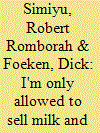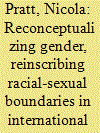|
|
|
Sort Order |
|
|
|
Items / Page
|
|
|
|
|
|
|
| Srl | Item |
| 1 |
ID:
124258


|
|
|
|
|
| Publication |
2013.
|
| Summary/Abstract |
This paper deals with the gender aspects of urban livestock keeping in Eldoret, Kenya. It shows that men and women play different but complementary roles in livestock keeping. Men show greater preference for and are more involved - in terms of decision-making and responsibility taking - with large livestock and where income is the primary motive for livestock keeping, and perform tasks of an outdoor nature and/or which require considerable technical knowledge. On the other hand, women prefer and exercise greater control over small livestock, make the most decisions about consumption use of livestock products, and perform home-based routine tasks. However, there are instances where men and women cross gender boundaries, for instance where labour of the opposite gender is absent in the household, or as a strategy to control benefits accruing to the livestock. In terms of livelihood outcomes, women's role in livestock keeping is geared more towards improving household nutritional and food security status, while men's role is motivated more by personal benefits.
|
|
|
|
|
|
|
|
|
|
|
|
|
|
|
|
| 2 |
ID:
126571


|
|
|
|
|
| Publication |
2013.
|
| Summary/Abstract |
The gendered boundaries of international security, historically identified by feminist scholarship, are being broken down since the passage of UN Security Council Resolution 1325, which calls on member states to mainstream a gender perspective into matters of conflict and peacebuilding. However, we should not read this as a positive step toward the transformation of the lives of women (and men) in conflict zones. Reading 1325 and subsequent resolutions through a postcolonial feminist lens reveals that this reconceptualization of gender occurs through a reinscription of racial-sexual boundaries, evocative of the political economy of imperialism. An examination of the discourses and practices of the "war on terror" exposes a similar configuration of gender, race, and sexuality. I argue that 1325 works in tandem with dominant security practices and discourses in the post-9/11 moment, normalizing the violence of counterterrorism and counterinsurgency measures. Understanding the significance of race and sexuality in the conceptualization of gender has implications for transnational feminist praxis and its ability to construct a counter-hegemonic project to transform the dominant structures of power that give rise to war, conflict, insecurity, and injustice.
|
|
|
|
|
|
|
|
|
|
|
|
|
|
|
|
|
|
|
|
|